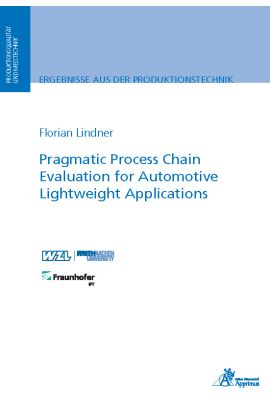Manufacturing companies are increasingly forced to make products that are indicated by beneficial ecological footprints. Especially automotive OEMs are forced by regulatory requirements to produce eco-efficient cars fulfilling critical emission targets on fleet level. Lightweight design represents a key enabling technology towards an eco-friendly mobility and decreased emissions. With regard to the manufacturing phase of a product, companies are forced to evaluate the corresponding manufacturing process chains in terms of cost-related and ecological efficiency. From an entrepreneurial view, the potential of new lightweight technologies needs to be indicated at an early stage. Against the background of low maturities of inventive lab-scale technologies in early development phases, boundary conditions and process chain characteristics are afflicted with uncertainties at this stage. As a conclusion, manufacturing companies are facing the contradictory problem of efficiently achieving reliable evaluation results for lab-scale automotive lightweight manufacturing process chains and to incorporate underlying uncertainties at the same time.
Against this background, the goal of this thesis was the development of an appropriate concept and the necessary tools for reliable, goal-oriented and efficient evaluation of manufacturing process chains containing lab-scale technologies. The result of this research is the pragmatic and model-based evaluation approach.
For this reason, a multi-criteria evaluation model for manufacturing process chains considering both ecological and economic goal dimension was designed. Uncertainty propagation is quantified via sampling simulation techniques. In addition, classification schemes to objectify data quality, acquisition efforts and spheres of influences with regard to parameter values and their uncertainties were introduced. Furthermore, interpretation rules for the distribution of results were defined. On this basis, the evaluation results are analyzed and iteratively improved by adaptions of model parameters to achieve the pre-defined significance level in a pragmatic manner.
The thesis evaluation approach was implemented in a software tool. The entire approach was executed on an inventive manufacturing process chain for a fiber-reinforced plastic component. Here, different methods for verification and validation of the thesis approach were applied to assess its formal correctness and validity in a practical application.
| Autor | Lindner, Florian |
|---|---|
| Lieferzeit | 3-4 Tage |
| Gewicht | 0.276 kg |
| Erscheinungsdatum | 16.11.2018 |
Produktionsqualität und Messtechnik
Pragmatic Process Chain Evaluation for Automotive Lightweight Applications
Kurzbeschreibung
The early economic and ecological evaluation of inventive lightweight manufacturing technologies is characterized by a contradictory problem: On the one hand, manufacturers need to evaluate those lab-scale technologies as precise as possible. On the other hand, this earliness complicates evaluations as information might be uncertain. The result of this thesis is a pragmatic and model-based evaluation approach, which is capable of assessing lab-scale technologies with pre-defined significance.

